 First: the French Open. Next stop: your wardrobes. Serena Williams is a verified tennis champion. Now, she's bringing her talent--and style perspective--to the masses with the Serena...
First: the French Open. Next stop: your wardrobes. Serena Williams is a verified tennis champion. Now, she's bringing her talent--and style perspective--to the masses with the Serena...from E! Online (US) - lifestyle https://ift.tt/2stiXQ1
 First: the French Open. Next stop: your wardrobes. Serena Williams is a verified tennis champion. Now, she's bringing her talent--and style perspective--to the masses with the Serena...
First: the French Open. Next stop: your wardrobes. Serena Williams is a verified tennis champion. Now, she's bringing her talent--and style perspective--to the masses with the Serena... While we may think of social media as quick snapshots of real life, let's be honest, perfecting your Instagram requires thought. You need to find the good lighting. You have to...
While we may think of social media as quick snapshots of real life, let's be honest, perfecting your Instagram requires thought. You need to find the good lighting. You have to... Your favorite student just accomplished the accomplishment of all accomplishments: graduating. Maybe it was high school, perhaps they finished college or they could have even gone for it...
Your favorite student just accomplished the accomplishment of all accomplishments: graduating. Maybe it was high school, perhaps they finished college or they could have even gone for it... The Markle Sparkle has hit the runway. The same natural, glowing-but-not-incandescent skin finish Meghan Markle wore for her nuptials to Prince Harry was also seen last Friday on the Dior...
The Markle Sparkle has hit the runway. The same natural, glowing-but-not-incandescent skin finish Meghan Markle wore for her nuptials to Prince Harry was also seen last Friday on the Dior... Rose all day...and we're not talking about the alcoholic variety. Get flushed--cosmetically, that is--by Rosie Huntington-Whiteley's new beauty site, Rose Inc. If you follow the...
Rose all day...and we're not talking about the alcoholic variety. Get flushed--cosmetically, that is--by Rosie Huntington-Whiteley's new beauty site, Rose Inc. If you follow the... When summer rolls around, what's the first thing you do? If you're anything like us you revel in the fact that the days are longer, the weather's warmer and your overall...
When summer rolls around, what's the first thing you do? If you're anything like us you revel in the fact that the days are longer, the weather's warmer and your overall... Date makeup is a thing. There's primer, in case the night goes long. Matte lipstick, so pigment doesn't budge. And, there's highlight, so your face can glow in all the right...
Date makeup is a thing. There's primer, in case the night goes long. Matte lipstick, so pigment doesn't budge. And, there's highlight, so your face can glow in all the right...Facebook’s Messenger Kids application, which allows children under 13 to chat with parents’ approval, is today rolling out a small, but notable change – it no longer requires that the children’s parents be Facebook friends with one another, in order for the children to connect. This solves one of the problems with the app’s earlier design, where it operated more like an extension of a parents’ own social circle, instead of one for their child.
Of course, parents still have to approve every contact their child adds, as usual.
As any parent understands, there are always going to be those friends of your child where you have an acquaintance-type, friendly but casual relationship with the parents that falls short of earning “Facebook friend” status. While you might text them for the occasional play date or nod politely at drop-off, you’re not necessarily “friends.” But your kids are friends with each other. And you’re fine with that.
The Messenger Kids update now allows those kids to connect, if you okay it.
 The new feature will still require that both parents are on Facebook.
The new feature will still require that both parents are on Facebook.
On Facebook, the parent visits the Messenger Kids section in Facebook’s own main navigation menu, as per usual, and does a search for the name of the parents of the child’s friends. You can then invite them to get the app and allow the children to connect.
This change could potentially help the app grow beyond the 500,000 installs it now has, according to Sensor Tower data – especially once the kids figure out how this invite system works. (And don’t put it past them to just inform you.)
Facebook says it made this decision as a direct result of parent feedback.
However, there is one challenge in not being good friends with the other kids’ parents: it can be harder to discuss problems like bullying or bad behavior, if they come up. With my daughter’s half a dozen or so friends on Messenger Kids (hey, I know), I’m not worried about these things because I know the parents well enough to have a discussion if the kids start fighting. We’d work together to resolve the problems, were they to occur. (And obviously, her family connections on the app are not an issue).
But when you start approving connections with those families you’re less close to, you may run into issues and not have a good way to communicate about them.
That’s why Facebook should be working to roll out systems that flag concerns in kids’ chat sessions – if a bad word is used, for example, or if the child says something rude – that alerts the child’s own parents. The company already has A.I.-based anti-bullying technology that could do this now. And I imagine many parents would opt into a system that asks if you wanted to be alerted to offensive language in chats.
Even a simple chat and call log could help parents address problems – like tell me how often I need to remind my daughter that we don’t place video calls to friends before 9 AM…even if you see them playing Animal Jam and know they’re online. Rules are rules, kiddo.
As it stands now, the best way to monitor the child’s chats is to install a second copy of the app on your own device and actually read them. That takes time and can be a little bit invasive for older kids, who have more of a sense of privacy.
The update is live today on the Messenger Kids app.
* This post was updated after publication with more current install data from Sensor Tower. Earlier, we said Messenger Kids had 350K installs as of April. It has now just passed 500K.
Want to understand all the most important tech stats and trends? Legendary venture capitalist Mary Meeker has just released the 2018 version of her famous Internet Trends report. It covers everything from mobile to commerce to the competition between tech giants. Check out the full report below, and we’ll add some highlights soon. Then come back for our slide-by-slide analysis of the most important parts of the 294 page report.

Mary Meeker, analyst with Morgan Stanley, speaks during the Web 2.0 Summit in San Francisco, California, U.S., on Tuesday, Nov. 16, 2010. This year’s conference, which runs through Nov. 17, is titled “Points of Control: The Battle for the Network Economy.” Photographer: Tony Avelar/Bloomberg via Getty Images
Snap CEO Evan Spiegel spoke a bit about some of the cultural issues at the company, going public and competition with Facebook at Recode’s annual Code Conference this evening in Rancho Palos Verdes, Calif.
Earlier today, Cheddar reported how a former Snap engineer criticized the company for a “toxic” and “sexist” culture that is not welcoming to women and people of color. In an email former Snap engineer Shannon Lubetich wrote in November, she described how Snap is not adequately promoting diversity at the company.
“The letter was a really good wake-up call for us,” Spiegel said.
Spiegel described how, in light of the letter, Snap hired external consultants to help the company figure out areas in which to improve. Snap also ran a company-wide survey and changed its promotion structure, Spiegel said. He later added that he’s “proud” of the progress Snap has made over the last few months.
In the letter, Lubetich also described a scenario in which scantily clad women, hired by Snap, dressed up in deer costumes.
“People are going to make mistakes and I was frustrated, to say the least, to see people dressed up as deer at a holiday party,” Spiegel said.
In addition to cultural issues, Snap has also struggled on the public market. Snap’s Q1 2018 earnings, for example, showed lackluster user growth numbers amid a rocky redesign and increased competition from Facebook. Still, Spiegel said the redesign was the right way to go, as was going public.
“I think this was the logical step forward in being an independent company,” Spiegel said about going public.
Meanwhile, Snap is constantly fending off competition from Facebook. Spiegel initially joked, “I think it bothers my wife more than it bothers me.”
But in all seriousness, Spiegel said Snap’s values of deepening relationships with the people closest to you is “really hard to copy.” Facebook, on the other hand, is more about having people compete online for attention, Spiegel said.
He also joked, in light of the Cambridge Analytica scandal, that Snap would “appreciate it if [Facebook] copied our data protection practices as well.”
Snapchat is secretly planning the launch of its first full-fledged developer platform, currently called Snapkit. The platform’s prototypes indicate it will let other apps offer a “login with Snapchat” options, use the Bitmoji avatars it acquired and host a version of Snap’s full-featured camera software that can share back to Snapchat. Multiple sources confirm Snap Inc. is currently in talks with several app developers to integrate Snapkit.
The platform could breathe new life into plateauing Snapchat by colonizing the mobile app ecosystem with its login buttons and content. Facebook used a similar strategy to become a ubiquitous utility with tentacles touching everyone’s business. But teens, long skeptical of Facebook and unsettled by the recent Cambridge Analytica scandal, could look to Snapchat for a privacy-safe way to log in to other apps without creating a new username and password.
Snap Inc. declined to comment on this story.

Snapchat is making a big course correction in its strategy here after years of rejecting outside developers. In 2014, unofficial apps that let you surreptitiously save Snaps but required your Snapchat credentials caused data breaches, leading the company to reiterate its ban on using them. It also shut off sharing from a popular third-party music video sharing app called Mindie. In fact, Snap’s terms of service still say “You will not use or develop any third-party applications that interact with the Services or other users’ content or information without our written consent.”
A year ago I wrote that “Snap’s anti-developer attitude is an augmented liability” since it would be tough to populate the physical world with AR experiences unless it has help like Facebook had started recruiting. By December, Snapchat had launched Lens Studio, which lets brands and developers build limited AR content for the app. And it’s been building out its cadre of marketing and analytics partners with which brands can work.
Yet until now, Snapchat hadn’t created functionality that developers could use in their own apps. Snapkit will change that. We don’t know when it will be announced or launched, or who will be the initial developers who take advantage of it. But with Snapchat slipping to its lowest user growth rate ever after being pummeled by competition from Facebook and Instagram, the company needs more than a puppy face filter to regain the spotlight.
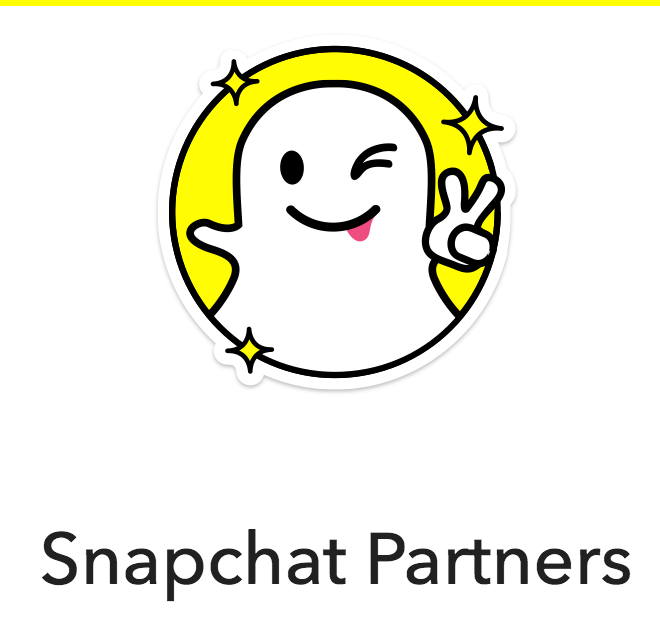 According to sources familiar with Snap’s discussions with potential developers, Snapkit’s login with Snapchat feature is designed to let users sign up for new apps with their Snapchat credentials instead of creating new ones. Because Snap doesn’t collect much personal info about you, unlike Facebook, there’s less data to worry about accidentally giving to developers or them misusing. Displaying its branded button on various app’s signup pages could lure in new Snapchat users or reengage lapsed ones. It’s also the key to developing tighter ties between Snap and other apps, even if users sign up for apps another way.
According to sources familiar with Snap’s discussions with potential developers, Snapkit’s login with Snapchat feature is designed to let users sign up for new apps with their Snapchat credentials instead of creating new ones. Because Snap doesn’t collect much personal info about you, unlike Facebook, there’s less data to worry about accidentally giving to developers or them misusing. Displaying its branded button on various app’s signup pages could lure in new Snapchat users or reengage lapsed ones. It’s also the key to developing tighter ties between Snap and other apps, even if users sign up for apps another way.
One benefit of another app knowing who you are on Snapchat, which the company plans to provide with Snapkit, is the ability to bring your Bitmoji avatar with you. Snapchat acquired Bitmoji’s parent company Bitstrips for just $64.2 million in 2016, but the cartoonish personalized avatar app has been a staple of the top 10 chart since. It remains one of Snapchat’s most differentiated offerings, as Facebook has only recently begun work on its clone called Facebook Avatars.
While Bitmoji has offered a keyboard full of your avatar in different scenes, Snapkit could make it easy to add yours as stickers on photos or in other ways in third-party apps. Seeing them across the mobile universe could inspire more users to create their own Bitmoji lookalike.
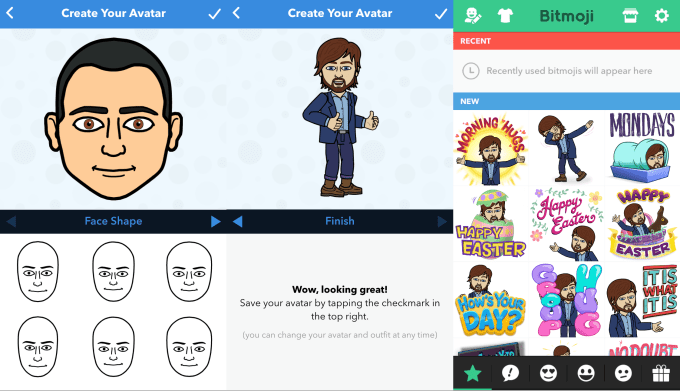
Snapchat is also working on a way for developers to integrate its editing tool-laden and AR-equipped camera into their own apps. Instead of having to reinvent the wheel if they want to permit visual sharing and inevitably building a poor knockoff, apps could just add Snapchat’s polished camera. The idea is the photos and videos shot with the camera could then be used in that app as well as shared back to Snapchat. Similar to Facebook and Instagram Stories opening up to posts from third-parties, this could inject fresh forms of content into Snapchat at a time when usage is slipping.
Launching a platform also means Snapchat will take on new risks, as third-parties with access to user data could be breached. Snap also will have to convince developers that making it easier for its 191 million daily users to join their apps is worth the engineering resources, given how that community is dwarfed by the multi-billion user Google and Facebook login systems. Login with Snapchat could be especially popular with teen-focused anonymous, or dating, apps you don’t want connected to your Facebook profile.
Snapchat has struggled to get out of Facebook’s shadow despite inventing or acquiring what would become some of the hottest trends in social. Yet Snap Inc. could develop alliances with a platform that leverages its differentiators — a teen audience that doesn’t care for Facebook, inherent privacy and custom avatars. Through an army of developers, Snapchat might find the firepower to challenge the blue empire.
For more on Snapchat and its competitors, check out our other coverage:
In an ongoing series over at Motherboard, we’re learning quite a bit about how Facebook polices hate speech and hate organizations on its platform. Historically, the company has been far less than transparent about its often inconsistent censorship practices, even as white supremacist content — and plenty of other forms of hate targeted at marginalized groups — runs rampant on the platform.
Now we know more about why. For one, according to a series of internal slides on white supremacy, Facebook walks a fine line that arguably doesn’t exist at all. According to these post-Charlottesville training documents, the company opted to officially differentiate between white nationalism and white supremacy, allowing the former and forbidding the latter.
Facebook appears to take the distinction between white nationalism and white supremacy seriously, but many white nationalists don’t, opting only for the slightly more benign term to soften their image. This is a well-documented phenomenon, as anyone who has spent time in these online circles can attest. It’s also the first sentence in the Anti Defamation League (ADL) entry on white nationalism:
White nationalism is a term that originated among white supremacists as a euphemism for white supremacy.
Eventually, some white supremacists tried to distinguish it further by using it to refer to a form of white supremacy that emphasizes defining a country or region by white racial identity and which seeks to promote the interests of whites exclusively, typically at the expense of people of other backgrounds.
As Motherboard reports, Facebook notes “overlaps with white nationalism/separatism” as a challenge in its relevant training notes section for white supremacy, adding that “Media reports also use the terms interchangeably (for example referring to David Duke as white supremacist even though he doesn’t explicitly identify himself as one).”
Facebook’s own articulation of white supremacy offers considerable concessions:
Although there doesn’t seem to be total agreement among academics on whether white supremacy always implies racial hatred, the fact that it is based on a racist premise is widely acknowledged. [original emphasis]
Most of Facebook’s slides on hate speech and hate groups read like an embarrassingly simplistic CliffsNotes, lacking nuance and revealing the company’s apparently slapdash approach to the issue of racial hate. Tellingly, some portions of Facebook’s training text copy Wikipedia’s own language verbatim.
Here are the first few sentences of the Wikipedia entry on white supremacy:
White supremacy or white supremacism is a racist ideology based upon the belief that white people are superior in many ways to people of other races and that therefore white people should be dominant over other races.
White supremacy has roots in scientific racism and it often relies on pseudoscientific arguments. Like most similar movements such as neo-Nazism, white supremacists typically oppose members of other races as well as Jews.
Facebook’s training note on white supremacy, with differences bolded:
White supremacy or white supremacism is a racist ideology based upon the belief that white people are superior in many ways to people of other races and that therefore white people should be dominant over other races. White supremacy has roots in scientific racism and it often relies on pseudoscientific arguments. Like most similar movements such as neo-Nazism, white supremacists typically oppose people of color, Jews and non-Protestants.

Facebook slides recreated by Motherboard
Bafflingly, Facebook also notes that “White nationalism and calling for an exclusively white state is not a violation for our policy unless it explicitly excludes other PCs [protected characteristics]” which by definition, a white state does.
According to slides recreated by Motherboard, Facebook asserts that “we don’t allow praise, support and representation of white supremacy as an ideology” but stipulates that it does “allow praise, support and representation” for both white nationalism and white separatism. [Again, emphasis theirs.]
Facebook further clarifies:
By the same token, we allow to call for the creation of white ethno-states (e.g. “The US should be a white-only nation”).
By failing to recognize the political motivations behind white nationalism as an identity, Facebook legitimates white nationalism as something meaningfully distinct from white supremacy. While not all white nationalists call for the dream of a white ethnostate to be achieved through racial domination — and arguably the two could be studied distinctly from a purely academic perspective — they have far more in common than they have differences. Even with such thin sourcing, Facebook has devoted a surprising amount of language to differentiating the two.
In grappling with this question after Charlottesville, the Associated Press offered this clarification for its own coverage:
For many people the terms can be used almost interchangeably. Both terms describe groups that favor whites and support discrimination by race.
The AP also mentions the “subtle difference” that white supremacists believe whites to be superior.
For white nationalists, that attitude at times appears more implicit than explicit but that doesn’t mean it’s not there. From my own reading and considerable hours spent immersed online in white nationalist groups and forums, there is massive observable ideological overlap between the two groups. The instances in which white supremacists and white nationalists truly espouse wholly distinct ideologies are rare.
Further, it’s impossible to ignore that violence against non-whites is a central thread running throughout white nationalism, whether stated or implied. Imagining a white ethnostate that does not directly come about at the cost of the safety, wellbeing and financial security of racial minorities is pure fantasy — a fantasy Facebook is apparently content to entertain in pretending that the “white state” would not “explicitly exclude” anyone based on the protected characteristic of race.
The Southern Poverty Law Center (SPLC) defines white nationalism in similarly broad strokes, tying it directly to white supremacy and stating that “white nationalist groups espouse white supremacist or white separatist ideologies, often focusing on the alleged inferiority of nonwhites.”
The SPLC, an organization devoted to studying hate, explains the expedient fallacy of the white ethnostate as a nonviolent goal:
These racist aspirations are most commonly articulated as the desire to form a white ethnostate — a calculated idiom favored by white nationalists in order to obscure the inherent violence of such a radical project. Appeals for the white ethnostate are often disingenuously couched in proclamations of love for members of their own race, rather than hatred for others.
Apparently, Facebook ignored most dissenting definitions linking white nationalist goals directly to white supremacy. Naively or not, the company bought into white supremacy’s slightly more palatable public-facing image in shaping its policy platforms. In sourcing its policies, Facebook was apparently content to pick and choose which points supported its decision to allow white nationalism on its platform while supposedly casting out white supremacy.
“White nationalist groups espouse white separatism and white supremacy,” the Wikipedia page that Facebook drew from states. “Critics argue that the term ‘white nationalism’ and ideas such as white pride exist solely to provide a sanitized public face for white supremacy, and that most white nationalist groups promote racial violence.”
Sadly, for anyone who has watched many virulent strains of racism flourish and even organize on Facebook, the company’s shoddily crafted internal guidance on white supremacy comes as little surprise. Nor does the fact that the company failed to dedicate even a sliver of its considerable resources to understanding the nuance of white supremacist movements, aims and language.
We reached out to Facebook to see if these alarmingly reductive policies on racial hate have evolved in recent months (these materials are less than a year old), but the company only pointed us to the broad public-facing “Community Standards.” Any further detail on the actual implementation of policies around hate remains opaque.
Though it may have learned some harsh lessons in 2018, for Facebook, opacity is always the best policy.
Whether it’s surveilling or deceiving users, mishandling or selling their data, or engendering unhealthy habits or thoughts, tech these days is not short on unethical behavior. But it isn’t enough to just say “that’s creepy.” Fortunately, a course at the University of Washington is equipping its students with the philosophical insights to better identify — and fix — tech’s pernicious lack of ethics.
“Designing for Evil” just concluded its first quarter at UW’s Information School, where prospective creators of apps and services like those we all rely on daily learn the tools of the trade. But thanks to Alexis Hiniker, who teaches the class, they are also learning the critical skill of inquiring into the moral and ethical implications of those apps and services.
What, for example, is a good way of going about making a dating app that is inclusive and promotes healthy relationships? How can an AI imitating a human avoid unnecessary deception? How can something as invasive as China’s proposed citizen scoring system be made as user-friendly as it is possible to be?
I talked to all the student teams at a poster session held on UW’s campus, and also chatted with Hiniker, who designed the course and seemed pleased at how it turned out.
The premise is that the students are given a crash course in ethical philosophy that acquaints them with influential ideas, such as utilitarianism and deontology.

“It’s designed to be as accessible to lay people as possible,” Hiniker told me. “These aren’t philosophy students — this is a design class. But I wanted to see what I could get away with.”
The primary text is Harvard philosophy professor Michael Sandel’s popular book Justice, which Hiniker felt combined the various philosophies into a readable, integrated format. After ingesting this, the students grouped up and picked an app or technology that they would evaluate using the principles described, and then prescribe ethical remedies.
As it turned out, finding ethical problems in tech was the easy part — and fixes for them ranged from the trivial to the impossible. Their insights were interesting, but I got the feeling from many of them that there was a sort of disappointment at the fact that so much of what tech offers, or how it offers it, is inescapably and fundamentally unethical.
I found the students fell into one of three categories.
WebMD is of course a very useful site, but it was plain to the students that it lacked inclusivity: its symptom checker is stacked against non-English-speakers and those who might not know the names of symptoms. The team suggested a more visual symptom reporter, with a basic body map and non-written symptom and pain indicators.
Hello Barbie, the doll that chats back to kids, is certainly a minefield of potential legal and ethical violations, but there’s no reason it can’t be done right. With parental consent and careful engineering it will be in line with privacy laws, but the team said that it still failed some tests of keeping the dialogue with kids healthy and parents informed. The scripts for interaction, they said, should be public — which is obvious in retrospect — and audio should be analyzed on device rather than in the cloud. Lastly, a set of warning words or phrases indicating unhealthy behaviors could warn parents of things like self-harm while keeping the rest of the conversation secret.

WeChat Discover allows users to find others around them and see recent photos they’ve taken — it’s opt-in, which is good, but it can be filtered by gender, promoting a hookup culture that the team said is frowned on in China. It also obscures many user controls behind multiple layers of menus, which may cause people to share location when they don’t intend to. Some basic UI fixes were proposed by the students, and a few ideas on how to combat the possibility of unwanted advances from strangers.
Netflix isn’t evil, but its tendency to promote binge-watching has robbed its users of many an hour. This team felt that some basic user-set limits like two episodes per day, or delaying the next episode by a certain amount of time, could interrupt the habit and encourage people to take back control of their time.
FakeApp is a way to face-swap in video, producing convincing fakes in which a politician or friend appears to be saying something they didn’t. It’s fundamentally deceptive, of course, in a broad sense, but really only if the clips are passed on as genuine. Watermarks visible and invisible, as well as controlled cropping of source videos, were this team’s suggestion, though ultimately the technology won’t yield to these voluntary mitigations. So really, an informed populace is the only answer. Good luck with that!
 China’s “social credit” system is not actually, the students argued, absolutely unethical — that judgment involves a certain amount of cultural bias. But I’m comfortable putting it here because of the massive ethical questions it has sidestepped and dismissed on the road to deployment. Their highly practical suggestions, however, were focused on making the system more accountable and transparent. Contest reports of behavior, see what types of things have contributed to your own score, see how it has changed over time, and so on.
China’s “social credit” system is not actually, the students argued, absolutely unethical — that judgment involves a certain amount of cultural bias. But I’m comfortable putting it here because of the massive ethical questions it has sidestepped and dismissed on the road to deployment. Their highly practical suggestions, however, were focused on making the system more accountable and transparent. Contest reports of behavior, see what types of things have contributed to your own score, see how it has changed over time, and so on.
Tinder’s unethical nature, according to the team, was based on the fact that it was ostensibly about forming human connections but is very plainly designed to be a meat market. Forcing people to think of themselves as physical objects first and foremost in pursuit of romance is not healthy, they argued, and causes people to devalue themselves. As a countermeasure, they suggested having responses to questions or prompts be the first thing you see about a person. You’d have to swipe based on that before seeing any pictures. I suggested having some deal-breaker questions you’d have to agree on, as well. It’s not a bad idea, though open to gaming (like the rest of online dating).
The League, on the other hand, was a dating app that proved intractable to ethical guidelines. Not only was it a meat market, but it was a meat market where people paid to be among the self-selected “elite” and could filter by ethnicity and other troubling categories. Their suggestions of removing the fee and these filters, among other things, essentially destroyed the product. Unfortunately, The League is an unethical product for unethical people. No amount of tweaking will change that.
Duplex was taken on by a smart team that nevertheless clearly only started their project after Google I/O. Unfortunately, they found that the fundamental deception intrinsic in an AI posing as a human is ethically impermissible. It could, of course, identify itself — but that would spoil the entire value proposition. But they also asked a question I didn’t think to ask myself in my own coverage: why isn’t this AI exhausting all other options before calling a human? It could visit the site, send a text, use other apps and so on. AIs in general should default to interacting with websites and apps first, then to other AIs, then and only then to people — at which time it should say it’s an AI.
To me the most valuable part of all these inquiries was learning what hopefully becomes a habit: to look at the fundamental ethical soundness of a business or technology and be able to articulate it.
That may be the difference in a meeting between being able to say something vague and easily blown off, like “I don’t think that’s a good idea,” and describing a specific harm and reason why that harm is important — and perhaps how it can be avoided.
As for Hiniker, she has some ideas for improving the course should it be approved for a repeat next year. A broader set of texts, for one: “More diverse writers, more diverse voices,” she said. And ideally it could even be expanded to a multi-quarter course so that the students get more than a light dusting of ethics.
With any luck the kids in this course (and any in the future) will be able to help make those choices, leading to fewer Leagues and Duplexes and more COPPA-compliant smart toys and dating apps that don’t sabotage self-esteem.
Imgur is the internet’s best time sink, where 250 million monthly users silently consume an endless community-curated collection of absurd GIFs, inspiring tales, pop science explainers and giant meme dumps. But what it’s never had is video. That was a differentiator that made it ideal for quiet browsing in class, on public transit or in bed. Since none of the content required audio, you never had to worry about grabbing your headphones or disturbing those around you.
But the lack of video was also holding Imgur back. Sometimes you need to hear a crazy cat meow, or a baby giggling, or a crappy robot explode. So users would have to hunt down the “sauce,” aka the GIF’s source video, on another site. Oh, and advertisers love video and will pay a boatload more for it than a silent GIF or static image.
And so, Imgur is evolving with today’s launch of video. You can check them out, including this ream of popular GIFs reunited with their soundtracks, on the Imgur Unmuted channel.

The shift comes at a pivotal moment for the company. Launched in 2009, founder Alan Schaaf bootstrapped the startup to 130 million monthly visitors over the course of five years before finally taking a $40 million Series A from Andreessen Horowitz in 2014. Two years later it augmented its flimsy banner ads with full-screen promoted posts while trying not to damage the irreverent nature of the app.
Imgur’s Chief Operating Officer Roy Sehgal, its Sheryl Sandberg, tells me that as of recently “we were cash flow positive” before revealing “we expect to be profitable this year.”
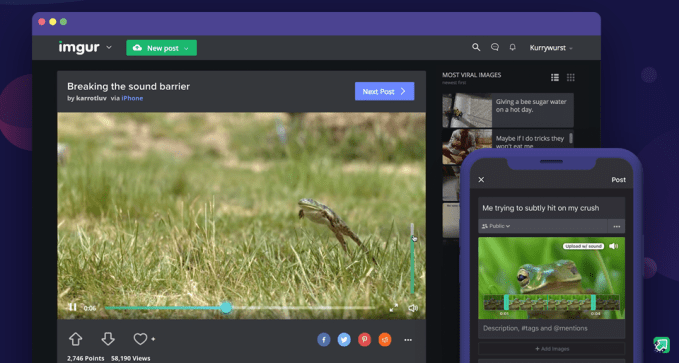
Video could push Imgur to that milestone. The more organic video posts from users, the easier it will be for Imgur to slide in lucrative video ads. Facebook printed money with the same strategy, rolling out auto-play video in 2014 to pave the way for video ads that command high prices from businesses. Imgur recently began allowing video ads, but they stuck out, seeming to violate the app’s code of silence. Now Imgur is training its users to tolerate or even embrace audio and video.
 Starting today, everyone can watch videos on Imgur, while iOS users can post video, with that opening to more people soon. Wisely, sound is off by default so you won’t get accidentally blasted, and technically you could just pretend they’re GIFs if you don’t click the audio button in the bottom right. They’re also limited to 30 seconds, so you won’t have lengthy YouTube reposts or as many copyright concerns, and they can be trimmed in the uploader.
Starting today, everyone can watch videos on Imgur, while iOS users can post video, with that opening to more people soon. Wisely, sound is off by default so you won’t get accidentally blasted, and technically you could just pretend they’re GIFs if you don’t click the audio button in the bottom right. They’re also limited to 30 seconds, so you won’t have lengthy YouTube reposts or as many copyright concerns, and they can be trimmed in the uploader.
“We’ve been making the transformation from an image community to a community-powered entertainment platform,” says Sehgal. Video could keep Imgur’s legion of users growing, and make sure they can experience today’s hottest content in whatever format it’s made for.
“We realized there was a vector of content we were not supporting that we thought our users would want,” Sehgal notes. The launch comes following the addition of much-requested Favorites folders and chat, and the Snapchat Stories-esque Snacks GIFs that no one asked for.
But video will bring a new sense of FOMO to those watching discretely. They’ll either have to swipe past the videos or miss the aural dimension. That could splinter Imgurians, who are otherwise united by a homescreen that shows identical top-rated content to everyone, unlike the fractured and personalized landing pages of most social networks. Some of Imgur’s funniest content relies on inside jokes powered by everyone having the right prerequisite knowledge from seeing the same things.

“They are definitely surprised,” says Sehgal, but he claims “the reaction has been very positive.” That’s not exactly clear from reading the Imgur Most Viral homepage, which just got a desktop redesign with bigger previews and easy access to popular tags you can explore. GIFs and still images still dominate and I’ve hardly seen any videos.
That could change as Imgur plans on equipping users with new editing tools to help them turn generic clips into weird and wacky stuff people love to upvote. Imgur’s existing Video-To-GIF creation tool has been a hit. Hopefully future editing tools will let people add custom subtitles, stickers, interjected titling screens and more. Those will be crucial to keep video from making Imgur generic.
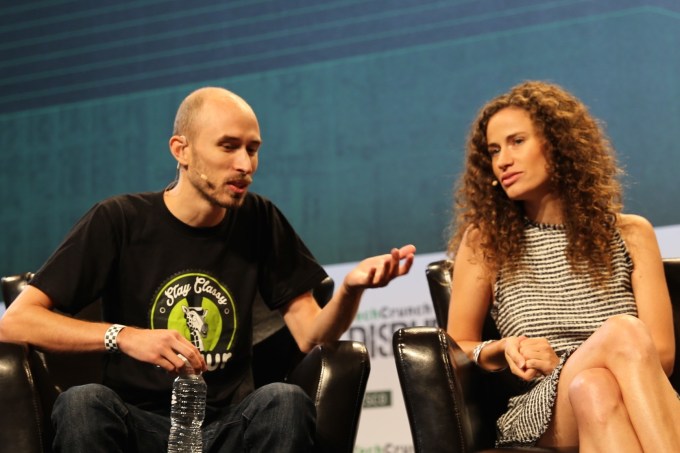
Alan Schaaf, founder of Imgur, and his sister/community director Sarah Schaaf, speaking at TechCrunch Disrupt
The pivot to video may be inevitable for all online content. Combined with every app from Instagram to Netflix to Airbnb adopting Snapchat’s Stories, there’s an unsettling convergence going on. Video may be the most vivid and emotive medium. Yet we’ll lose something if there’s a social network singularity where they all have the same features.
Imgur is looking to become a business that’s palatable to a mass audience with video. But it must take care not to forfeit esoteric absurdity that’s made it a vacation from the overwhelming news and envy spiraling of other feeds.
Ahead of 2018 U.S. midterm elections, Twitter is taking a visible step to combat the spread of misinformation on its famously chaotic platform. In a blog post this week, the company explained how it would be adding “election labels” to the profiles of candidates running for political office.
“Twitter has become the first place voters go to seek accurate information, resources, and breaking news from journalists, political candidates, and elected officials,” the company wrote in its announcement. “We understand the significance of this responsibility and our teams are building new ways for people who use Twitter to identify original sources and authentic information.”
These labels feature a small government building icon and text identifying the position a candidate is running for and the state or district where the race is taking place. The label information included in the profile will also appear elsewhere on Twitter, even when tweets are embedded off-site.

The labels will start popping up after May 30 and will apply to candidates in state governor races as well as those campaigning for a seat in the Senate or the House of Representatives.
Twitter will partner with nonpartisan political nonprofit Ballotpedia to create the candidate labels. In a statement announcing its partnership, Ballotpedia explains how that process will work:
Ballotpedia covers all candidates in every upcoming election occurring within the 100 most-populated cities in the U.S., plus all federal and statewide elections, including ballot measures. After each state primary, Ballotpedia will provide Twitter with information on gubernatorial and Congressional candidates who will appear on the November ballot. After receiving consent from each candidate, Twitter will apply the labels to each candidate profile.
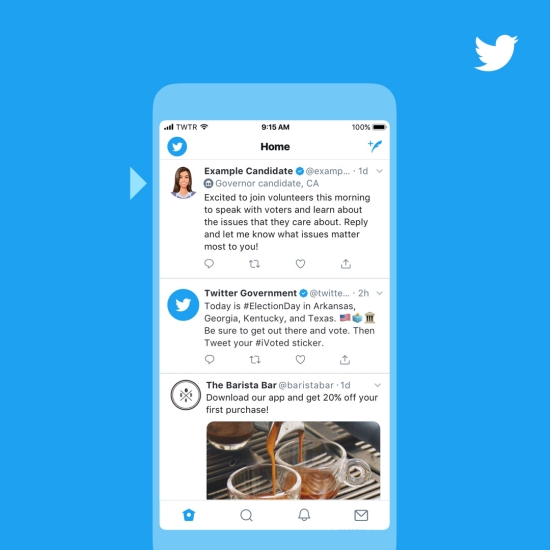
The decision to create a dedicated process to verify political profiles is a step in the right direction for Twitter. With major social platforms still in upheaval over revelations around foreign misinformation campaigns during the 2016 U.S. presidential election, Twitter and Facebook need to take decisive action now if they intend to inoculate their users against a repeat threat in 2018.
After two years coming down the pipe at tech giants, Europe’s new privacy framework, the General Data Protection Regulation (GDPR), is now being applied — and long time Facebook privacy critic, Max Schrems, has wasted no time in filing four complaints relating to (certain) companies’ ‘take it or leave it’ stance when it comes to consent.
The complaints have been filed on behalf of (unnamed) individual users — with one filed against Facebook; one against Facebook-owned Instagram; one against Facebook-owned WhatsApp; and one against Google’s Android.
Schrems argues that the companies are using a strategy of “forced consent” to continue processing the individuals’ personal data — when in fact the law requires that users be given a free choice unless a consent is strictly necessary for provision of the service. (And, well, Facebook claims its core product is social networking — rather than farming people’s personal data for ad targeting.)
“It’s simple: Anything strictly necessary for a service does not need consent boxes anymore. For everything else users must have a real choice to say ‘yes’ or ‘no’,” Schrems writes in a statement.
“Facebook has even blocked accounts of users who have not given consent,” he adds. “In the end users only had the choice to delete the account or hit the “agree”-button — that’s not a free choice, it more reminds of a North Korean election process.”
We’ve reached out to all the companies involved for comment and will update this story with any response. Update: Facebook has now sent the following statement, attributed to its chief privacy officer, Erin Egan: “We have prepared for the past 18 months to ensure we meet the requirements of the GDPR. We have made our policies clearer, our privacy settings easier to find and introduced better tools for people to access, download, and delete their information. Our work to improve people’s privacy doesn’t stop on May 25th. For example, we’re building Clear History: a way for everyone to see the websites and apps that send us information when you use them, clear this information from your account, and turn off our ability to store it associated with your account going forward.”
Schrems most recently founded a not-for-profit digital rights organization to focus on strategic litigation around the bloc’s updated privacy framework, and the complaints have been filed via this crowdfunded NGO — which is called noyb (aka ‘none of your business’).
As we pointed out in our GDPR explainer, the provision in the regulation allowing for collective enforcement of individuals’ data rights is an important one, with the potential to strengthen the implementation of the law by enabling non-profit organizations such as noyb to file complaints on behalf of individuals — thereby helping to redress the power imbalance between corporate giants and consumer rights.
That said, the GDPR’s collective redress provision is a component that Member States can choose to derogate from, which helps explain why the first four complaints have been filed with data protection agencies in Austria, Belgium, France and Hamburg in Germany — regions that also have data protection agencies with a strong record of defending privacy rights.
Given that the Facebook companies involved in these complaints have their European headquarters in Ireland it’s likely the Irish data protection agency will get involved too. And it’s fair to say that, within Europe, Ireland does not have a strong reputation as a data protection rights champion.
But the GDPR allows for DPAs in different jurisdictions to work together in instances where they have joint concerns and where a service crosses borders — so noyb’s action looks intended to test this element of the new framework too.
Under the penalty structure of GDPR, major violations of the law can attract fines as large as 4% of a company’s global revenue which, in the case of Facebook or Google, implies they could be on the hook for more than a billion euros apiece — if they are deemed to have violated the law, as the complaints argue.
That said, given how freshly fixed in place the rules are, some EU regulators may well tread softly on the enforcement front — at least in the first instances, to give companies some benefit of the doubt and/or a chance to make amends to come into compliance if they are deemed to be falling short of the new standards.
However, in instances where companies themselves appear to be attempting to deform the law with a willfully self-serving interpretation of the rules, regulators may feel they need to act swiftly to nip any disingenuousness in the bud.
“We probably will not immediately have billions of penalty payments, but the corporations have intentionally violated the GDPR, so we expect a corresponding penalty under GDPR,” writes Schrems.
Only yesterday, for example, Facebook founder Mark Zuckerberg — speaking in an on stage interview at the VivaTech conference in Paris — claimed his company hasn’t had to make any radical changes to comply with GDPR, and further claimed that a “vast majority” of Facebook users are willingly opting in to targeted advertising via its new consent flow.
“We’ve been rolling out the GDPR flows for a number of weeks now in order to make sure that we were doing this in a good way and that we could take into account everyone’s feedback before the May 25 deadline. And one of the things that I’ve found interesting is that the vast majority of people choose to opt in to make it so that we can use the data from other apps and websites that they’re using to make ads better. Because the reality is if you’re willing to see ads in a service you want them to be relevant and good ads,” said Zuckerberg.
He did not mention that the dominant social network does not offer people a free choice on accepting or declining targeted advertising. The new consent flow Facebook revealed ahead of GDPR only offers the ‘choice’ of quitting Facebook entirely if a person does not want to accept targeting advertising. Which, well, isn’t much of a choice given how powerful the network is. (Additionally, it’s worth pointing out that Facebook continues tracking non-users — so even deleting a Facebook account does not guarantee that Facebook will stop processing your personal data.)
Asked about how Facebook’s business model will be affected by the new rules, Zuckerberg essentially claimed nothing significant will change — “because giving people control of how their data is used has been a core principle of Facebook since the beginning”.
“The GDPR adds some new controls and then there’s some areas that we need to comply with but overall it isn’t such a massive departure from how we’ve approached this in the past,” he claimed. “I mean I don’t want to downplay it — there are strong new rules that we’ve needed to put a bunch of work into making sure that we complied with — but as a whole the philosophy behind this is not completely different from how we’ve approached things.
“In order to be able to give people the tools to connect in all the ways they want and build community a lot of philosophy that is encoded in a regulation like GDPR is really how we’ve thought about all this stuff for a long time. So I don’t want to understate the areas where there are new rules that we’ve had to go and implement but I also don’t want to make it seem like this is a massive departure in how we’ve thought about this stuff.”
Zuckerberg faced a range of tough questions on these points from the EU parliament earlier this week. But he avoided answering them in any meaningful detail.
So EU regulators are essentially facing a first test of their mettle — i.e. whether they are willing to step up and defend the line of the law against big tech’s attempts to reshape it in their business model’s image.
Privacy laws are nothing new in Europe but robust enforcement of them would certainly be a breath of fresh air. And now at least, thanks to GDPR, there’s a penalties structure in place to provide incentives as well as teeth, and spin up a market around strategic litigation — with Schrems and noyb in the vanguard.
Schrems also makes the point that small startups and local companies are less likely to be able to use the kind of strong-arm ‘take it or leave it’ tactics on users that big tech is able to unilaterally apply and extract ‘consent’ as a consequence of the reach and power of their platforms — arguing there’s an underlying competition concern that GDPR could also help to redress.
“The fight against forced consent ensures that the corporations cannot force users to consent,” he writes. “This is especially important so that monopolies have no advantage over small businesses.”